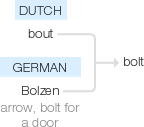Bolt
Old English, ‘arrow’, of unknown origin; related to Dutch bout and German Bolzen ‘arrow, bolt for a door’.
wiktionary
From Middle English bolt, from Old English bolt, from Proto-Germanic *bultaz, perhaps from Proto-Indo-European *bʰeld-(“to knock, strike”). Compare Lithuanian beldu(“I knock”), baldas(“pole for striking”). [1] Akin to Dutch and West Frisian bout, German Bolz or Bolzen, Danish bolt, Swedish bult, Icelandic bolti.
From Middle English bulten, from Anglo-Norman buleter, Old French bulter (modern French bluter), from a Germanic source originally meaning "bag, pouch" cognate with Middle High German biuteln(“to sift”), from Proto-Germanic *buzdô(“beetle, grub, swelling”), from Proto-Indo-European *bʰūs-(“to move quickly”). Cognate with Dutch buidel.
etymonline
bolt (n.)
Old English bolt "short, stout arrow with a heavy head;" also "crossbow for throwing bolts," from Proto-Germanic *bultas (source also of Old Norse bolti, Danish bolt, Dutch bout, German Bolzen), perhaps originally "arrow, missile," and from PIE *bheld- "to knock, strike" (source also of Lithuanian beldžiu "I knock," baldas "pole for striking").
Applied since Middle English to other short metal rods (especially those with knobbed ends): meanings "stout pin for fastening objects together" and "part of a lock which springs out" are both from c. 1400. A bolt of canvas (c. 1400) was so called for its shape. Adverbial phrase bolt upright (like a bolt or arrow) is from late 14c. Meaning "sliding metal rod that thrusts the cartridge into the chamber of a firearm" is from 1859. From the notion of an arrow's flight comes the bolt of lightning (1530s) and the sense of "a sudden spring or start" (1540s).
bolt (v.)
from bolt (n.) in its various senses (especially "a missile" and "a fastening"); from a crossbow arrow's quick flight comes the meaning "to spring, to make a quick start" (early 13c.). Via the notion of fleeing game or runaway horses, this came to mean "to leave suddenly" (1610s). Meaning "to gulp down food" is from 1794. The meaning "to secure by means of a bolt" is from 1580s. Related: Bolted; bolting.
